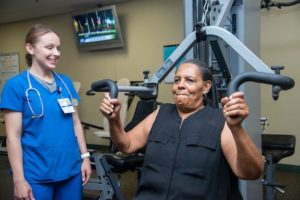
A Beaumont Health study featured in Medicine & Science in Sports & Exercise, the official journal of the American College of Sports Medicine, found that middle-aged and older women who exercise moderately to vigorously, three times a week for at least 30 minutes, were able to significantly reduce cardiac risk factors in just six months.
Specifically, participants in Beaumont’s Women Exercising to Live Longer (WELL) program achieved reductions in weight, cholesterol, and blood pressure, along with symptoms of depression and anxiety.
While heart disease is the leading killer of women in the United States, many women still struggle to embrace lifestyle changes that can prevent the disease.
These include following a heart healthy diet and, according to the American Heart Association, getting at least 30 minutes of moderate to vigorous aerobic exercise a day, five days per week.
“For many women who are sedentary, the thought of exercising five to seven days a week can be daunting,” said Megan Bowdon, clinical exercise physiologist and manager of Cardiac Rehab and Preventive Cardiology at Beaumont Hospital.
Funded through donor support, the WELL program provides women who might not otherwise have access the opportunity to exercise, free-of-charge, with the support and guidance of trained clinical exercise physiologists and nurses.
Study participant, Patricia Hale, 72, lost a significant amount of weight and a total of 17 inches on the program.
“It’s an amazing feeling when your physician gives you confirmation that your numbers have improved,” said Hale. “After I stopped working, I gained weight and developed breathing problems. I had never formally exercised before, but I knew I didn’t want to go out like that. My mother, aunt, and cousin all died at age 42 of heart disease.”
Fellow study participant, Pauline Flaga, 76, a 20-year breast cancer survivor, also lost weight and reduced her blood pressure by embracing exercise through the program after her husband recovered from a quadruple bypass.
“Seeing my husband suffer so much inspired me to take action,” said Flaga, who also appreciated the encouragement to get doctor check-ups and cardiac testing prior to participation in the WELL program. “I did not want to go down the same path he did.”
“The challenge is to reduce barriers to exercise… by increasing access to community-based exercise programs,” said Barry Franklin, PhD, director of Preventive Cardiology and Rehabilitation, Beaumont Hospital. “It is our hope and goal that many more women with disparities in cardiovascular health and traditional risk factors may realize the benefits regular exercise can provide.”
“We also received a lot of positive feedback on how exercise improves the mental outlook of our women – and that’s huge,” Bowdon continued. “Depression and anxiety can have major, negative impact on quality of life.”
This article was adapted from information provided by Beaumont Health.